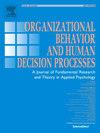The idea endorser’s dilemma: How status dynamics disincentivize creative idea endorsement
IF 3.8
2区 管理学
Q2 MANAGEMENT
Organizational Behavior and Human Decision Processes
Pub Date : 2025-07-30
DOI:10.1016/j.obhdp.2025.104439
引用次数: 0
Abstract
Employees’ creative ideas often require managerial endorsement to be implemented. It is therefore important to understand factors that impact managers’ willingness to endorse their employees’ creative ideas. We investigate the role of social status dynamics and test two main hypotheses. First, we find managers lose more status for endorsing an idea that fails than they gain for endorsing an idea that succeeds (asymmetric status change hypothesis). Second, we find managers’ status gain for endorsing an idea that succeeds is smaller than the idea generating employee’s status gain, producing a status distance loss (status distance hypothesis). We characterize these findings as the idea endorser’s dilemma. Study 1 tested these hypotheses and Studies 2A-B tested boundary conditions of perceiver role and idea creativity. Study 3 investigated an attribution search mechanism, finding that the status change patterns were attenuated by a prompt that drew attention to the manager’s contributions. Study 4 found that managers are intuitively aware of these status dynamics and anticipate not only no status loss for rejecting an idea, but also a status distance gain over the employee whose idea they rejected. We discuss implications for creativity research and for implementing creative ideas in organizations.
观点支持者的困境:地位动态如何抑制创意观点的支持
员工的创意往往需要管理层的认可才能实现。因此,了解影响管理者认可员工创意意愿的因素是很重要的。我们研究了社会地位动态的作用,并检验了两个主要假设。首先,我们发现管理者认可一个失败的想法比认可一个成功的想法更容易失去地位(不对称地位变化假设)。其次,我们发现管理者支持一个成功的想法所获得的地位收益小于使员工获得地位收益的想法,从而产生了地位距离损失(地位距离假设)。我们将这些发现定性为“观点支持者的困境”。研究1检验了这些假设,研究2A-B检验了感知者角色和想法创造力的边界条件。研究3对归因搜索机制进行了研究,发现状态变化模式被关注管理者贡献的提示所减弱。研究4发现,经理们本能地意识到这些地位动态,并预期拒绝一个想法不仅不会导致地位损失,而且还会增加与他们拒绝了一个想法的员工的地位差距。我们讨论了对创造力研究和在组织中实施创造性想法的影响。
本文章由计算机程序翻译,如有差异,请以英文原文为准。
求助全文
约1分钟内获得全文
求助全文
来源期刊
CiteScore
8.90
自引率
4.30%
发文量
68
期刊介绍:
Organizational Behavior and Human Decision Processes publishes fundamental research in organizational behavior, organizational psychology, and human cognition, judgment, and decision-making. The journal features articles that present original empirical research, theory development, meta-analysis, and methodological advancements relevant to the substantive domains served by the journal. Topics covered by the journal include perception, cognition, judgment, attitudes, emotion, well-being, motivation, choice, and performance. We are interested in articles that investigate these topics as they pertain to individuals, dyads, groups, and other social collectives. For each topic, we place a premium on articles that make fundamental and substantial contributions to understanding psychological processes relevant to human attitudes, cognitions, and behavior in organizations. In order to be considered for publication in OBHDP a manuscript has to include the following: 1.Demonstrate an interesting behavioral/psychological phenomenon 2.Make a significant theoretical and empirical contribution to the existing literature 3.Identify and test the underlying psychological mechanism for the newly discovered behavioral/psychological phenomenon 4.Have practical implications in organizational context

 求助内容:
求助内容: 应助结果提醒方式:
应助结果提醒方式:


